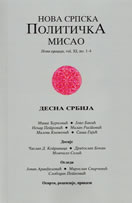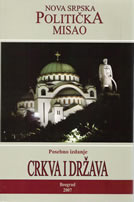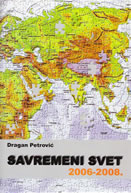| NSPM in English | |||
Ukrainian Presidential Elections |
 |
 |
 |
| петак, 26. фебруар 2010. | |
|
While Gvosdev and Saunders acknowledged Prime Minister Yulia Tymoshenko’s continuing court challenge of the election result, neither expected it to succeed. Saunders endorsed President Obama’s prompt congratulatory telephone call to Yanukovych, which came in the wake of favorable reports about the conduct of the voting from international observers. “There is no doubt that Yanukovych remembers America’s role in preventing him from becoming president in 2004,” Saunders said, “but at least in his public statements he doesn’t hold it against us.” Saunders argued that Ukraine’s deep political divisions in some respects helped to country to establish a competitive political system by creating a powerful structural force for pluralism. However, he said, if the country’s divisions lead to continuing political paralysis, it could be very damaging to Ukraine’s chances for economic recovery in the wake of a 15% contraction in its economy in 2009. Saunders also suggested that corruption would be a major obstacle to growth. A participant in the session seconded this view, arguing that while corruption was rampant in both Russia and Ukraine, foreign companies had at least some political recourse in Moscow, where it was clearer who is in charge. Gvosdev was deeply critical of the western response to the Orange Revolution, arguing that many politicians and commentators suggested that “EU membership is around the corner” for Ukraine when they had little or no intent to do what was necessary to make it happen. For example, he said, while everyone wore orange neckties and pledged support for a new wave of democracy in Ukraine when the newly-elected President Yushchenko addressed a joint session of Congress in 2005, the Congress did not produce meaningful support for the country. Of course, Gvosdev added, President Yushchenko also failed to uphold the sweeping change many in the west expected to result from his rise to power, both through his own mistakes and because of the realities of Ukraine’s dysfunctional political system. Former National Security Advisor Brent Scowcroft summed up this discussion, saying that “we are now back in the real world, and it appears that [the Orange Revolution] was just one step in a long evolution of Ukraine’s history.” Looking ahead, Simes predicted that “because Yanukovych is unlikely to have a strong functioning coalition throughout his administration, he will need to accept helping hands” from outside Ukraine. Russia is likely willing to help, he continued, adding that the United States could both assist Kyiv and increase its leverage over Yanukovych’s administration by encouraging the resumption of International Monetary Fund lending to Ukraine. According to Saunders, an IMF plan would also help Ukraine to borrow elsewhere on international markets to finance its government deficit. Other participants proposed easing IMF lending criteria to make them more realistic and providing assistance to Ukraine in combating corruption. Kazakh Ambassador Erlan Idrissov argued that the U.S. should launch a “Second Marshall Plan” in order to stabilize Ukraine and other former Soviet Republics. In his view, the region’s greatest challenge is not a lack of democracy, but weaknesses in the rule of law. He suggested that a large-scale U.S.-led international assistance program could make a major difference in strengthening both rule of law and economic development. Saunders agreed with this, but was skeptical that Washington could start a major initiative like this while deeply engaged in Afghanistan and Iraq. “We can’t have a Marshall Plan because we have a Petraeus plan,” he said. The panelists agreed that considerably greater economic and military alignment between Ukraine and Russia was not a foregone conclusion. Said Saunders, “I am fairly skeptical of the idea that [Yanukovych] will be as pro-Russian as everybody thinks. I do not believe that someone becomes president of a country in order to just subordinate it to someone else’s interests.” Gvosdev added that while it is “clear that he will not pursue military integration with the west at any cost, public opinion will likely impact many of the decisions of his presidency- and public opinion polls show that Ukraine’s population is not enthusiastic about joining the [Moscow-led] Collective Security Treaty Organization either.” Gvosdev argued that Yanukovych will take a very pragmatic approach to Russia’s lease to use its Sevastopol naval base, which expires in 2017. Though Yushchenko had promised to expel Russia, Yanukovych sees potential domestic political benefits from either negotiating either higher rental fees (and preserving jobs related to the base) or the Fleet’s relocation. The latter is an unlikely scenario, however, unless potential sites in Abkhazia are rendered usable prior to 2017. Simes added that it is a mistake to assume that Moscow is determined to keep the base, noting how difficult it was for Russia to employ its forces there during the August 2008 war with Georgia. In his view, Russian leaders may be ready to leave the base but “don’t want to be kicked out” and would want to depart “on their own schedule.” Gvosdev predicted that Yanukovych would pursue a the idea of a pipeline consortium involving Russia and European countries to win needed infrastructure investment while reducing Moscow’s motivation to develop new routes that avoid Ukraine. Saunders agreed, adding that a stronger Ukraine-Russia energy relationship—within limits—would improve European energy security and actually provide Kyiv with more leverage over Moscow. Simes concluded that this would present Russian officials a “hard choice” between Russian national interests in a more stable relationship with Ukraine and Europe and Gazprom’s narrower interest in maximizing its revenue and control. http://www.nixoncenter.org/index.cfm?action=showpage&page=Ukraine-Elections-2010 |
Од истог аутора
Остали чланци у рубрици
- Playing With Fire in Ukraine
- Kosovo as a res extra commercium and the alchemy of colonization
- The Balkans XX years after NATO aggression: the case of the Republic of Srpska – past, present and future
- Из архиве - Remarks Before the Foreign Affairs Committee of the European Parliament
- Dysfunction in the Balkans - Can the Post-Yugoslav Settlement Survive?
- Serbia’s latest would-be savior is a modernizer, a strongman - or both
- Why the Ukraine Crisis Is the West’s Fault
- The Ghosts of World War I Circle over Ukraine
- Nato's action plan in Ukraine is right out of Dr Strangelove
- Why Yanukovych Said No to Europe

.jpg)








 Though American media have generally portrayed Viktor Yanukovych’s election as President of Ukraine as a blow to western interests and a boon to Russia’s perceived hold over Ukraine, two panelists speaking at The Nixon Center argued that the election is unlikely to have a dramatic effect on Ukraine’s orientation. Nikolas Gvosdev, Associate Professor at the Naval War College and Senior Editor of The National Interest, and Paul Saunders, Executive Director of the Nixon Center, expected Mr. Yanukovych to be first and foremost an advocate for Ukraine’s interests rather than Moscow’s or Washington’s. Nixon Center President Dimitri K. Simes moderated the discussion.
Though American media have generally portrayed Viktor Yanukovych’s election as President of Ukraine as a blow to western interests and a boon to Russia’s perceived hold over Ukraine, two panelists speaking at The Nixon Center argued that the election is unlikely to have a dramatic effect on Ukraine’s orientation. Nikolas Gvosdev, Associate Professor at the Naval War College and Senior Editor of The National Interest, and Paul Saunders, Executive Director of the Nixon Center, expected Mr. Yanukovych to be first and foremost an advocate for Ukraine’s interests rather than Moscow’s or Washington’s. Nixon Center President Dimitri K. Simes moderated the discussion.











